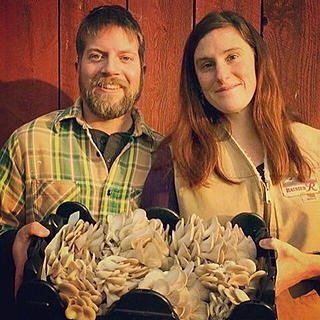Student Interview
- Mr. and Mrs. McKee
- Mar 16, 2019
- 5 min read
Kelly Powers, a college student, had a series of conversations with Carlyn for an assignment to "Interview An Entrepreneur".
The following essay was the result:

I conducted my interview was with Carlyn McKee. She and her husband, Dustan, run Greenwood Farm. At this point they: have their farmstead where they raise mushrooms for retail sale; started a CSA for their produce and have joined with local businesses to make it easy for their clients to pick up their weekly boxes; offer wholesale produce and delivery for local restaurants; have shippable products; organize and run a farmers market within a local mall (Columbia Colonnade, Bloomsburg PA) where over 30 local businesses can offer their products; offer classes at their farm and the market for public outreach and education. They are also in the process of publishing a comprehensive identification guide for mushrooms in the Northeast USA. I am not sure when Carlyn and Dustan find time to sleep! I really enjoyed talking with her and am looking forward to traveling the 2 hours to their farm to take one of their classes and get my copy of the book! What motivated you to start your own business? We like the lifestyle and cherish the freedom and responsibility that comes with it. We have skills that we want to use and share with the community. We love the challenge to be creative and efficient, that having our own farm business fosters. How did your past lead you to this business? About 10 years ago, we purchased a small homestead and had a couple dairy goats, chickens, ducks, and large garden. Once we started farming, we realized there was a niche for specialty bumper crops like mushrooms. We sold the dairy goats and moved to another farm that was closer to our families. Here we can grow portobella and cremini mushrooms in the winter without the use of chemicals. The substrate that those mushrooms grow in draw in a lot of insects in the summer. However, in the Spring, Summer and Fall we can grow oyster and shiitake mushrooms. We can also grow lion’s mane mushrooms as a specialty crop a few times a year. A lot of people didn’t know how to use or cook these types of mushrooms, so we had to build relationships and gain trust. We knew of the health benefits of mushrooms and we liked the idea of helping to alleviate hunger with a natural and foraged crop, but we had to educate our clients so that they feel comfortable using the mushrooms that are available in each season. Did you go to school for that particular field? I have a degree in Anthropology with an Archeology focus. Dustan went to school for photography and also carpentry. We have 15 years experience as entrepreneurs through our construction business and farm. Dusan most recently has gotten certified by the state as a wild mushroom expert. This was necessary for us to legally be able to forage and sell the wild mushrooms that we can not grow on the farm. We can also help others correctly identify mushrooms that they have foraged. At times, when there is an abundance, we purchase and resell these mushrooms. What type of business do you own? We recently converted from a sole proprietorship to an LLC. We felt, as did the insurance company, that with the increasing liability risk of the new ventures we are involved in it was necessary. We keep track of each of our ventures separately in order to be able to evaluate the profitability. They are all run under the LLC as separate entities. How did you choose your current location? The location of the Farm Market became available with many of the stores in our local mall closing down. We approached the owners of the property with the idea of starting an indoor farm market that could be open year-round. We explained that our mission would be: improve local food security and our local economy, connect the community to how food is cultivated and products are made, provide educational outreach about our ecosystem, and enrich the cultural heritage and community life. If we have any open booths for a particular weekend we offer these to local non-profits so that they can also educate the community of their missions. The owners liked the plan and we are opening the first weekend of April. How do you advertise? Our advertising is through Facebook, Instagram and other social media and our newsletters. What makes your business stand out from your competition? We do our best to make a good impression on all levels, and convey integrity and joy. Our success is tied together with many of our clients – if the restaurants and vendors at the farm market succeed, then so do we! We also believe in a large educational outreach component. We teach the community to cultivate wisely and forage safely which allows them a degree of food empowerment. We teach them the benefits of mushrooms and how to use/cook them. We promote the seasonality of foods.
What do you consider your target market? Anyone with an interest in learning. It does seem that most of our clients love to cook. They love to learn about and try new foods – especially mushrooms. When we tell them that we have a new, specialty mushroom available in a small quantity, they trust us to teach them what to do with it and they are willing to TRY. That means a lot to us – the trust that we have built. How many employees do you have? Dustan and I are our only official employees. We are looking at hiring 3 to 4 subcontractors to help us around the farm and with our businesses. What were your biggest obstacles? The learning curve to each of our new ventures has been the most difficult obstacle, especially with the mushrooms. Once we decided on our niche market of mushrooms, we had to learn how to grow them on a large scale. Dustan also had to get certified by the state for us to be able to sell foraged mushrooms. Tracking and strategy planning was also new to us, so we had to learn it before we could implement it within the business. It is very important and was worthwhile to learn, but it took some time. Coming up with our bulk/wholesale pricing was also a learning process. There wasn’t a lot of information out there that applied to what we were trying to do, so it was a lot of trial and error. What advise can you give someone thinking of going into business for themselves? Write and use a business plan. Don’t use credit cards to finance your business unless it is your only option Be really careful what you share on social media. That is out there for everyone to see and affects your image. Always be VERY gracious. Don’t be afraid to really connect with people. If you connect and have real conversations with people, they will appreciate the time you spend with them. It is important to know you are a real person, not just a business wanting their money. Rely on community. This is a way to bring life connectiveness and community involvement to your business and in turn give back to the community that supports you. Would you do it again? Yes! It would be nice to know what we know now, back when we started. We didn’t have any formal business training and I feel now that it would have been a good thing to have! We have learned so much through all of our businesses and continue to learn every day. We love being a part of the community, teaching those that want to know more about what we do and what we know, and learning from others.
We are happy to report that Kelly earned a 100% grade on her assignment!


























Comments